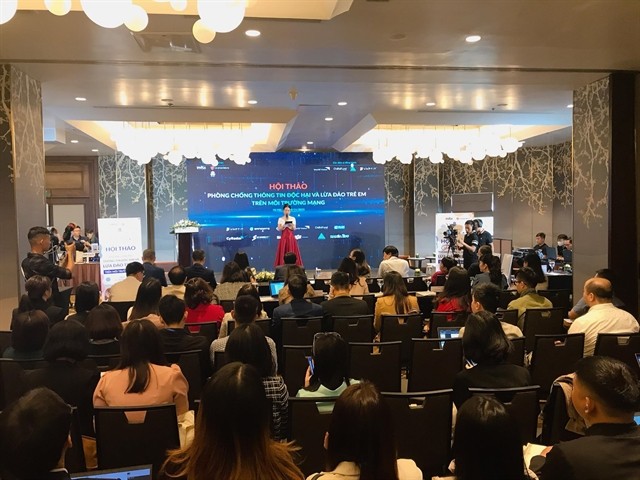 An overview of the seminar on preventing and combating harmful information and fraud against children in the online environment held in Hanoi early last month (Photo: Thu Trang/VNS) An overview of the seminar on preventing and combating harmful information and fraud against children in the online environment held in Hanoi early last month (Photo: Thu Trang/VNS)
|
The advent of the internet and smart devices has given children new ways to explore the world and easier access to information.
Along with the benefits, children also face a risk of accessing harmful information online. According to The ChildFund Vietnam, 76% of children are meeting new friends on social networks.
The Authority of Information Security at the Ministry of Information and Communications said online fraud in Vietnam increased 65% in the first half of this year. 2023 has seen an increase in online fraud directed at the elderly, low-income workers, students, and children.
It’s a challenge for families, schools, and State agencies to protect children online, says Ngo Tuan Anh, Chairman of the Vietnam Cyber Safety for Children Club.
“The average Vietnamese child uses the Internet about six hours a day, tripling the recommended two hours a day,” said Tuan Anh, adding, “This makes it more likely the child will access harmful and false information. Because their resistance to harmful information is weaker than that of adults, they are more vulnerable."
To give Vietnamese children a healthy environment in which to grow and develop, agencies, organizations, businesses, and the community need to join efforts.
 An online gambling game in which players can deposit and withdraw money from their in-game account easily. (Photo: Trong Dat) An online gambling game in which players can deposit and withdraw money from their in-game account easily. (Photo: Trong Dat)
|
Nguyen Thu Ha, who is part of World Vision Vietnam’s “Against Child Exploitation” project, says more initiatives are needed to raise children's awareness and skills by combining educational activities at school and experiential activities in the community.
There are many educational materials on the issue, but they are very theoretical and difficult for children to apply in practice, said Ha.
“But the projects of the Child Fund, Plan, and World Vision link young people with games and experiential activities so they can improve their awareness and self-help skills. By promoting child protection at the grassroots level, World Vision has developed an ecological model connecting family, community, and school to give children resistance to temptations and exploitation online,” according to Ha.
Experts say Vietnam needs an ecosystem of products for children that combine education with entertainment.
Trinh Thanh Binh, Deputy President of the Lancs Vietnam Network Technology Company, said that most companies on the Internet try to exercise some control over the content of social networks.
“But to go to the root of the issue, a vast amount of data is needed. We need to define what types of websites and what types of content on Facebook and TikTok should be considered sensitive. A single solution or app is not sufficient to resolve the issue. We need to use AI technology to identify all the risks,” said Binh.
According to Dinh Thi Nhu Hoa, Head of Cybersecurity Emergency Response Teams/Coordination Center at the Ministry of Information and Communications, the agency regularly checks social networks and handles violators who provide malicious or violent content harmful to children.
Hoa says a response network to protect children online has been established at vn-cop.vn to collect and process information harmful to children in the cyber environment.
“There are four principles that can help children stay safe online, which we call ‘principle 4T’,” said Hoa.
The first is to teach children to comply with the Internet usage rules set by service providers, schools, and families. Compliance is the first step to protecting ourselves. Second is to be smart in using solutions to protect children online by, for example, managing passwords and using security apps and other solutions to ensure safety.
Third is to be wary of strange links and attractive offers. Fourth is to behave civilly online, neither sending nor responding to messages with offensive content.
With its Online Child Protection Program until 2025, the Government of Vietnam has partnered with the information and communications technology industry to keep up with the pace of change and protect children from risks and new harms and ensure that the Internet is safe for children.
The private sector and community are encouraged to bring their expertise, experience and understanding to various solutions and opportunities to protect children online.